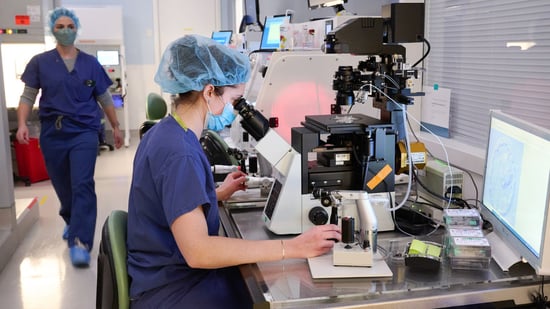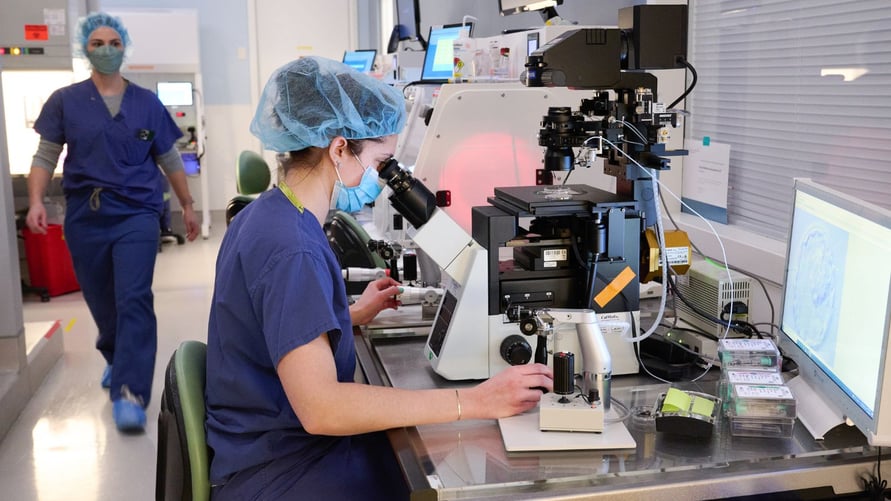What Happens Inside the IVF Lab? Your Questions Answered
July 25th, 2022 | 6 min. read


Happy World Embryologist Day! We’re celebrating the fascinating, important work that our embryologists must do every single day in order to make things like IVF and cryopreservation possible. Keep reading to learn more about IVF and embryology!
Skip to a section:
- LGBTQ+ Parents-to-Be & Fertility Treatment
- What do embryologists do?
- My embryo was abnormal…why did you still freeze it?
- How do you grade embryos and what does the grade mean?
- How long does it take to transfer in samples from another facility?
- How long do cryopreserved embryos last?
- If you used frozen sperm for my IUI/IVF procedure, why am I still receiving a storage bill?
- Honoring Our Embryologists
- More Family-Building Resources
LGBTQ+ Parents-to-Be & Fertility Treatment
While many prospective LGBTQ+ parents are not “infertile” in the traditional sense of the term, many moms and dads-to-be need the help of a fertility clinic (and the embryologists who work there) in order to build their families biologically. For dads, this may be the IVF cycle that’s part of their surrogacy journey. For moms, this could be an IUI, an IVF cycle using one or both partner’s eggs, or even a reciprocal IVF cycle.
So, in all cases, we have something to thank embryologists for on World Embryologist Day (which we recognize on July 25th each year). What is an embryologist? Well, they are the specially-skilled professionals that care for the eggs, the sperm, and ultimately, the embryo. They meticulously analyze and watch over the future of someone’s family…as Illume Fertility's Senior Embryologist Erica Paganetti puts it, embryologists are “your child’s first babysitter.”
What do embryologists do?
Gay Parents To Be works with Illume Fertility and the Embryology Lab there to take the best care of our patients’ future families. Erica Paganetti is Illume Fertility’s Senior Embryologist and Embryology Lab Manager. Along with her team, Erica fosters the early development of embryos. This includes monitoring, grading, testing, and freezing (also known as cryopreservation). In short, an embryologist is responsible for making sure your embryos, oocytes, or sperm are all safely stored for as long as you need.
This field is full of ooo’s and aww’s and may seem a bit mysterious. What's really happening in those dark labs? Is freezing my embryos for years and years really safe? Below, Erica answers some of the most frequently asked questions that she and her team receive, particularly concerning cryopreservation and embryos:
1. My embryo was abnormal…why did you still freeze it?
Embryos are cultured in our laboratory for a maximum of 7 days. Following the biopsy procedure, embryos must be cryopreserved while we wait for results from the genetics lab. So we don’t know for sure if they are abnormal or not when we first freeze them. Cryopreservation allows us to safely suspend the development of the embryos until you are ready to use them.
The samples collected from each embryo are loaded individually, labeled, and shipped to a genetic testing facility for processing. Genetic testing results have a turnaround time of about 2 weeks. We go ahead and freeze the embryos in hopes of a normal test result.
Learn more from one of our genetic counselors:
2. How do you grade embryos and what does the grade mean?
Before we send out any embryos for genetic testing or begin to cryopreserve them, we analyze each one using a very complex grading process. The grade is an overall assessment of the embryo’s developmental stage and quality. There can be significant variation in embryo grading, even within a single patient’s group of embryos.
We utilize the grade as an indicator of embryo quality, aiding us in selection for procedures such as embryo transfer, cryopreservation, and/or biopsy. Embryos eligible for these procedures fall within a range of grading criteria specific to our lab. Although there is a range of grades within embryos that can be transferred, cryopreserved, or biopsied, all of these embryos have significant reproductive potential.
If you have more questions about embryo grading, reach out to your Care Team! They're happy to help.
3. How long does it take to transfer in samples from another facility?
When a patient comes to us from another facility, with oocytes, sperm, and/or embryos in storage, they often request the transfer-in of these specimens.
We must collect all records related to these samples which include analysis reports, culture information, cryopreservation/warming protocols, infectious disease testing, etc. Once we receive all required paperwork, the records are reviewed for approval and the transport can be scheduled. From start to finish, this process generally takes about 3-6 weeks.
Want some inspiration for your journey?
4. How long do cryopreserved embryos last?
Cryopreservation suspends/halts embryo development indefinitely. These embryos do not have an expiration date and can be used at any point in the future.
The world record for the “oldest” embryo utilized to produce a pregnancy was frozen for 27 years before being thawed and transferred, resulting in a healthy baby girl. This embryo was originally cryopreserved on October 14, 1992, waiting to be thawed and transferred until February 2020.
Pretty incredible, right?
5. If you used frozen sperm for my IUI/IVF procedure, why am I still receiving a storage bill?
Cryopreserved semen samples are generally processed and stored in multiple vials for future use. Even if you have multiple vials available for use, when thawing vials of sperm for IUI and/or IVF, vials are warmed and processed one at a time. Additional vials are only thawed when absolutely necessary. This usually results in additional samples remaining in storage, so please be aware that fees will usually still apply, even after your cycle is complete.
Explore family-building options for moms:
Honoring Our Embryologists
On this World Embryologist Day, we want to thank Erica for sharing more about embryology and also thank all the other “first babysitters” out there with their heads down in labs, squinting through microscopes, taking special care of so many future families.
Want to go behind the scenes at our partner clinic Illume Fertility's embryology lab and learn more? Check of A Day in the Life of an Embryologist!
More Family-Building Resources
- Dan & Adam | An LGBTQ+ Family Building Story
- Rosa & Jackie | Love, Loss & Everything in Between
- Julien's Journey to Fatherhood: A Surrogacy Story
- Lesbian Family Planning | IUI vs IVF Fertility Treatment Options
- How Much Does It Really Cost for Two Moms to Have a Baby?
- Where Should Dads Look to Find the Right Egg Donor?
- For Gay Dads Starting Surrogacy, How Do You Choose Whose Sperm to Use?
- The Surrogacy Process: A Step By Step Guide for Gay Men
- What Should I Expect at My Embryo Transfer? | For Gay Couples
Sierra Dehmler is the Content Marketing Manager for Gay Parents To Be and its partner clinic, Illume Fertility. She is also a fertility patient herself. Combining empathy gained on her personal journey with her professional experience in marketing and content creation, she aims to empower and support other hopeful parents by providing family-building resources that educate, inspire and encourage.



